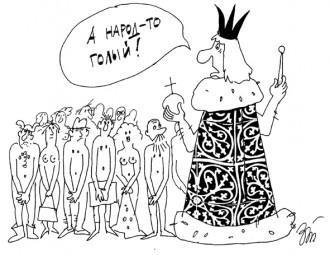Uladzimir Matskevich: Belarusan third sector is overloaded with dead organizations

What problems does the modern civil society face? And what is the major threat to the existence of civil society in Belarus?
The problems and threats to the civil society, the importance of understanding such category as “nation” expressed Uladzimir Matskevich, the leader of the National Platform of the Civil Society Forum (EaP CSF), to the EuroBelarus Information Service.
According to the politician, the major problems of the Belarusan civil society are evident: “On the one hand, what I’m saying is obvious – we have poor legislation and poor conditions for law enforcement. Belarusan NGOs are in the very tough conditions for life and survival, which is the worst part of it. However, here I can add something that others don’t mention at all: Belarusan regime encourages the form of existence adopted from Europe, providing Belarusan NGOs with such conditions where formalities, such as tremendously difficult accountancy, take away basically all energy and all free time. Of course, all that can be found in European countries as well, but in Europe this is the work of specially hired officials controlled by the people who have organized these NGOs. In our country, however, basically all the action is wasted on formation, existence and survival of the created NGO”.
According to Uladzimir Matskevich, this is where our main problem is hidden: “Only those who can get away from all those formal obligations and allocate time for thinking, criticism, reflection, evaluation, and mere human discussion are capable of something. But there are very few of them in Belarus, and all the rest are involved in some kind of vicious circle. All there activity consists in maintaining their registration without which they cannot work, their office, accountancy and so on. And there is no time left to achieve all the things which originally formed the aim of the organization”.
“When working, we all are someone’s toolbox”
According to Uladzimir Matskevich, the formalization of the NGO’s activity is one of the major problems for the civil society of Belarus, though it can be solved: “I dissolve this problem for myself. First, I clearly single out the hired workers and those who deal with formal procedures. Those people are the toolbox for the NGO; indeed, all the people who are working are tools and have to do their work not the way they see it, but the way they are asked to do it. It means that you are not free at work; you become free when you have free time. And as soon as we understand it we start creating free space, place and time, and this is where civil society comes from. I clearly see that the third sector in Belarus in overcrowded with such dead organizations unable of any independent civil actions and strictly performing only statutory goals and aims, as well as their action plans required for donations. They are the so-called “fake-demonstrative products”. Thus, civil society is not about NGO; it’s all about the place and time for the free people to prove themselves”.
“This problem is not strictly Belarusan; it exists in Europe, too. However, it is extremely hard to destroy European civil society with inherent traditions. And there civil society will never be identified as the third sector, which is only the representation and the means of the whole civil society”, - highlights Uladzimir Matskevich.
“Bureaucratization of processes is but dangerous”
Discussing problems with the Belarusan civil society in the pan-European context, Belarus can become the victim of all that bureaucratization and formalization through NGOs and other third-sector phenomena: “This part of civil society can take up all the rest. This phenomenon cannot be found in Western European countries, Low Countries and Scandinavia, where civil society has self-generated, evolved and exists now. Whereas to the Eastern Europe (except for Czech Republic) the civil society was imported. And it means that all the tendencies in the third sector are extremely dangerous for our country”.
“The ongoing processes present the biggest threat for the small countries. If bureaucratization doesn’t destroy civil society in France no matter what, Denmark witnesses the displacement of the civil society’s living part”.
“The nation is not those people about whom the songs are composed”
Eastern Europe faces one more threat. Uladzimir Matskevich identifies it as populism, i.e. unawareness of the place and role of the civil society when it comes to the state, cultural and other processes: “This misunderstanding of the civil society role in the democratic structure, unawareness that civil society is made up of those people who form the state, and who are the very civil society. However, only those people who think freely and have responsible and free opinion are the people that the Constitution mentions”.
“The nation is not those people about whom the songs are composed; the category of “nation” is used by populists and demagogues in order to organize ochlocratic dictatorships in the countries. And until we understand the essence of all these notions – nation, civil society, free people, – we will live under the constant threat that the populist culture, civilization, normal development will prevail. This is what makes the major threat to the Eastern European countries”, - Uladzimir Matskevich notes.
He admits that the constant fight with this urgent problem is going on. “My attitude towards people is good; if I name someone for a fool, it means that I believe that this specific person is foolish, not the whole nation. However, in any nation the whole civilization, culture and democracy are supported by several hundred people. And it is these people who represent nation, while all the rest form the background. It may sound crazy and radically for someone, but this is just the way it is”.
-
03.01
-
07.10
-
22.09
-
17.08
-
12.08
-
30.09








































